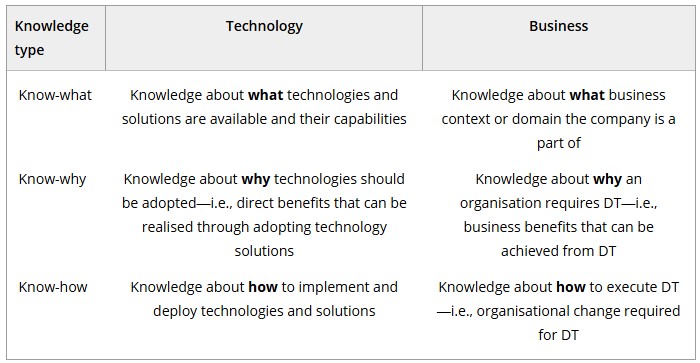As businesses race to harness the disruptive potential of AI and other emerging technologies, a study from the University of Sydney Business School identifies knowledge assessment and strategic recruitment as critical to successful digital transformation.
Inspired by her background in the adoption and diffusion of emerging technologies, lead author Dr Malmi Amadoru sought to understand why most businesses fail to achieve their digital project goals.
"Much of the literature focuses on skills and experience, which are absolutely necessary, but even those with a wealth of experience can fail when faced with the inherently novel challenges posed by new technology," Dr Amadoru said.
"Our study examines the 'missing link' of knowledge in these projects - what leaders really need to know to lead a digital project that is going to achieve all its aims."
The authors of the study, published in Information Systems Journal , developed a new framework that separates technological and business understanding against three knowledge types: know-what, know-why and know-how.

The digital transformation knowledge framework developed by the study authors. Header image: Adobe Stock
They then applied this framework to 138 interview excerpts of chief technology officers (CTOs), chief information officers (CIOs) and chief digital officers (CDOs).
It emerged that understanding technology know-what and business know-how were the most crucial areas for leaders overseeing successful projects.
"This helps answer the practical question of who you recruit to lead a digital transformation project," Dr Amadoru said.
"Organisations need to prioritise assessing the knowledge of potential candidates during the recruitment process, alongside traditional qualifications, prior experiences and skills. Our knowledge framework can be seamlessly integrated into the recruitment process, from defining job profiles to guiding evaluations and interviews.
"Knowledge needs vary significantly depending on the specific focus of the digital transformation. Our research suggests that a strategic combination of leadership roles can yield the best outcomes as each role brings a unique blend of technology and business knowledge; combining them allows organisations to leverage these varying degrees of expertise."
Beyond the life of one project, Dr Amadoru said the study also has implications for organisational culture.
"Leaders who commit to and role model continuous learning help foster that culture within their organisations, and our framework provides a structured method for identifying knowledge gaps and establishing the infrastructure to address them."
Declaration
This work was supported by the University of Sydney Business School and the Canada Research Chairs programme, specifically the Canada Research Chair on Enterprise Social Media & Digital Collaboration.






